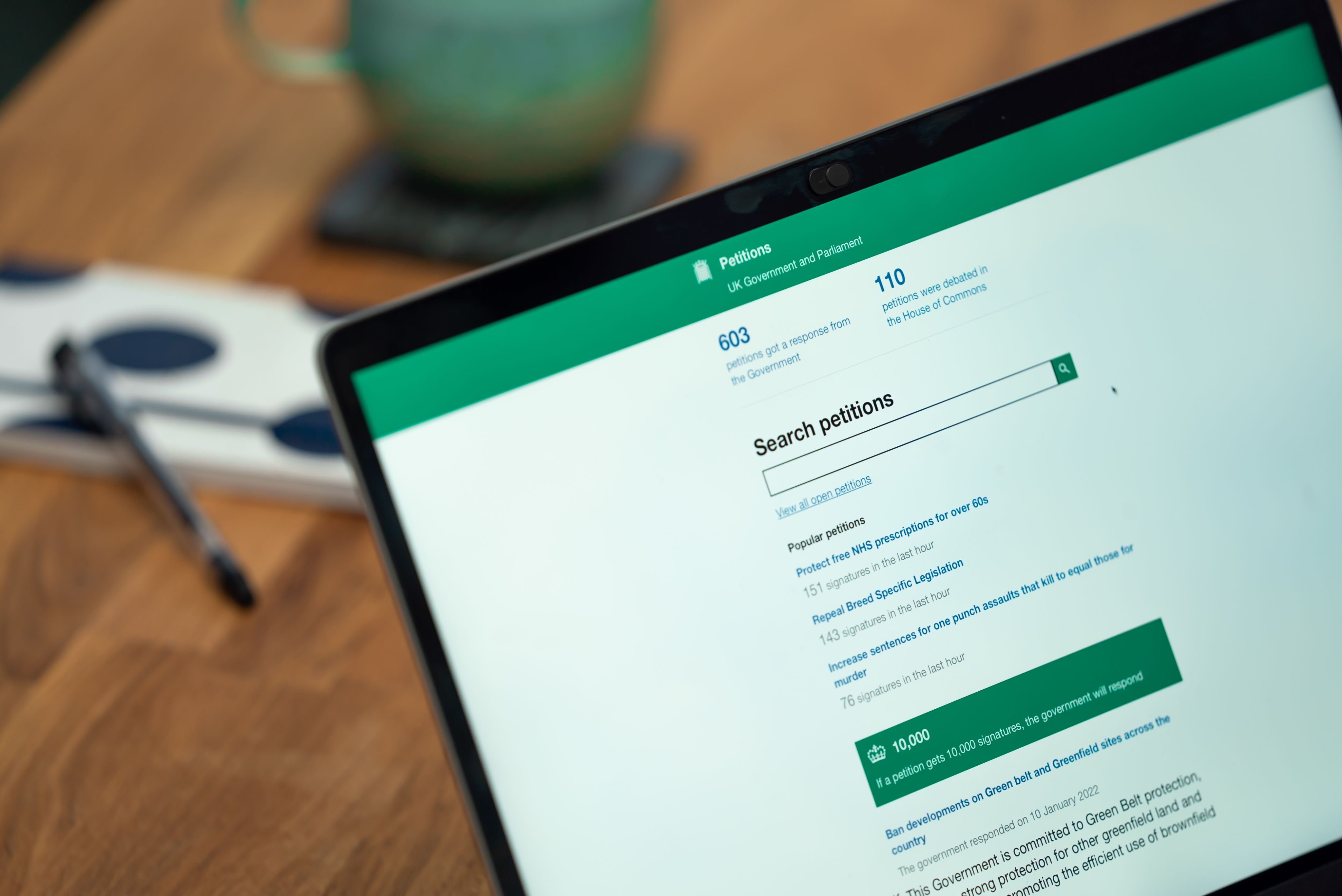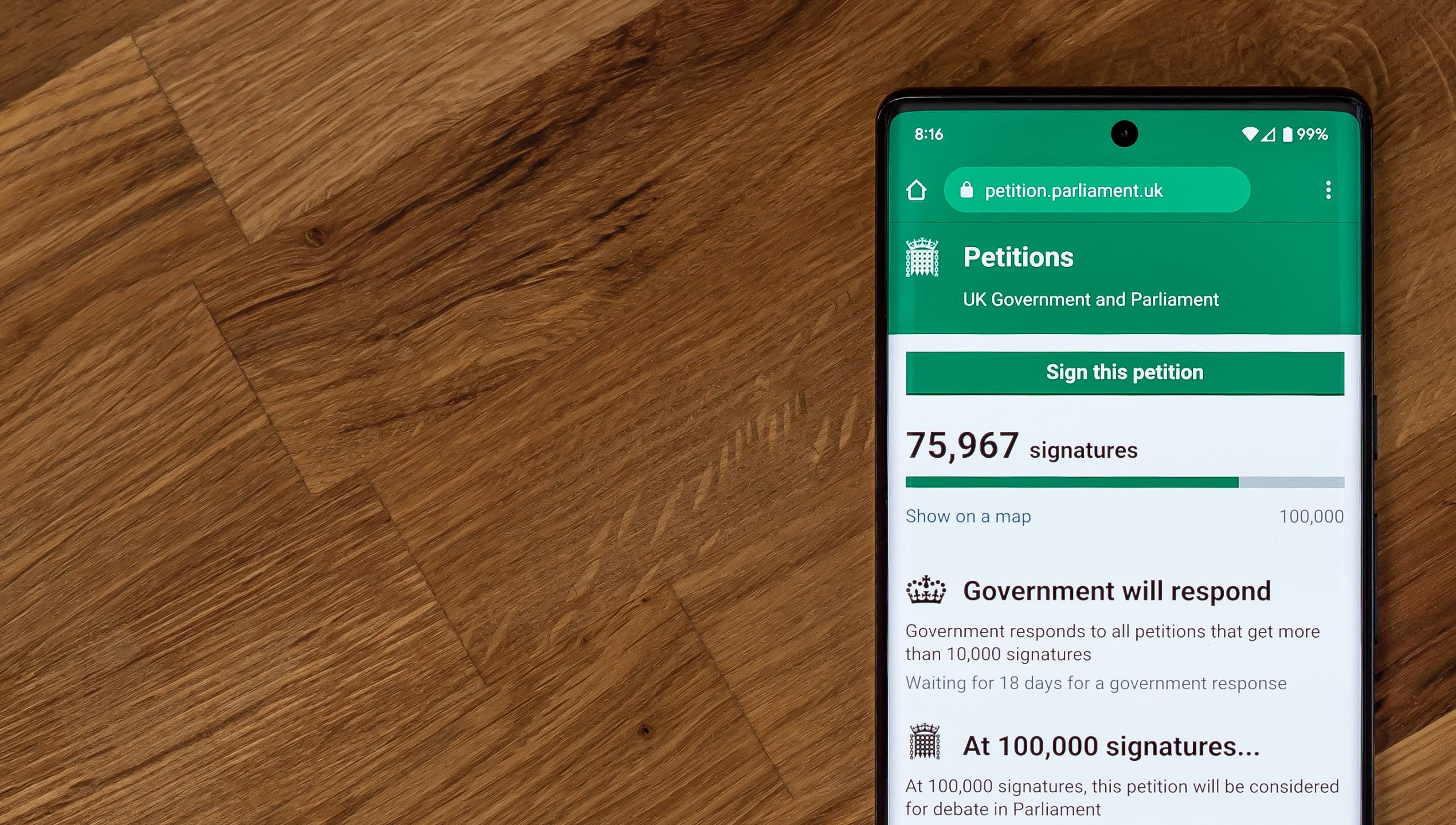The impact of e-petitions

2015: Introduce a 'Sugar Tax'
Celebrity chef, Jamie Oliver, started a petition for a sugar tax to improve children’s health.
It gained over 150,000 signatures and was debated in Parliament.
In 2018 the government introduced the Soft Drinks Industry Levy to reduce sugar in soft drinks and tackle childhood obesity.
2016: Ban requirements for high heels at work
Nicola Thorp was sent home from work without pay when she refused to wear high heels.
Her petition to make it illegal for employers to require women to wear high heels gathered 150,000 signatures.
In 2018, the Government issued guidance on dress codes and sex discrimination, explaining how the law applies to policies requiring women to wear specific clothing, including high heels.
2018: Make Orkambi available on the NHS for people with Cystic Fibrosis
Petition creators asked for the cystic fibrosis drug Orkambi (Lumacaftor/ivacaftor) to be made available on the NHS.
Two petitions on this issue gained over 225,000 signatures.
In 2019, a deal was made to provide the drug on the NHS.
2020: Improve maternal mortality rates for black women
Tinuke and Clo from Five X More started a petition that got over 180,000 signatures to improve maternal mortality rates and healthcare for black women.
In 2022, the Government announced actions to address health inequality, including the creation of a Maternity Disparities Taskforce.
2020: End child food poverty
Footballer Marcus Rashford launched a petition to end child food poverty, gaining over 1 million signatures. He urged the Government to expand access to free school meals.
The independent National Food Strategy was published in July 2021, and in June 2022, the Government responded with its own plan, outlining recommendations to improve the food system.
2021: Free prescriptions for the over 60s
Peter Hargreaves petitioned to protect free NHS prescriptions for over-60s, gathering 46,000 signatures.
In 2023, the Government announced it would not raise the age for free prescriptions.
2022: Increase the prison sentences for careless and dangerous driving
A petition creator started a petition to increase sentences for careless and dangerous driving after her son was killed by a drink driver.
The petition received over 13,000 signatures.
The 2022 Police, Crime, Sentencing and Courts Act increased the maximum penalty for causing death by dangerous or careless driving under the influence to life imprisonment.
2024: Make pet theft a specific criminal offence
Since the e-petitions website opened, petitioners have repeatedly asked for the Government to reclassify pet theft as a specific crime in its own right.
The Pet Abduction Act became law in 2024, recognising that cats and dogs are sentient beings capable of distress and trauma when they are stolen from their owners.
Examples:
Petitions that helped lead to change
2015: Introduce a 'Sugar Tax'
Celebrity chef, Jamie Oliver, started a petition for a sugar tax to improve children’s health.
It gained over 150,000 signatures and was debated in Parliament.
In 2018 the government introduced the Soft Drinks Industry Levy to reduce sugar in soft drinks and tackle childhood obesity.
2016: Ban requirements for high heels at work
Nicola Thorp was sent home from work without pay when she refused to wear high heels.
Her petition to make it illegal for employers to require women to wear high heels gathered 150,000 signatures.
In 2018, the Government issued guidance on dress codes and sex discrimination, explaining how the law applies to policies requiring women to wear specific clothing, including high heels.
2018: Make Orkambi available on the NHS for people with Cystic Fibrosis
Petition creators asked for the cystic fibrosis drug Orkambi (Lumacaftor/ivacaftor) to be made available on the NHS.
Two petitions on this issue gained over 225,000 signatures.
In 2019, a deal was made to provide the drug on the NHS.
2020: Improve maternal mortality rates for black women
Tinuke and Clo from Five X More, a women’s health organisation, started a petition that got over 180,000 signatures to improve maternal mortality rates and healthcare for black women.
In 2022, the Government announced actions to address health inequality, including the creation of a Maternity Disparities Taskforce.
2020: End child food poverty
Footballer Marcus Rashford launched a petition to end child food poverty, gaining over 1 million signatures. He urged the Government to expand access to free school meals.
The independent National Food Strategy was published in July 2021, and in June 2022, the Government responded with its own plan, outlining recommendations to improve the food system.
2021: Free prescriptions for the over 60s
Peter Hargreaves petitioned to protect free NHS prescriptions for over-60s, gathering 46,000 signatures.
In 2023, the Government announced it would not raise the age for free prescriptions.
2022: Increase the prison sentences for careless and dangerous driving
A petition creator started a petition to increase sentences for careless and dangerous driving after her son was killed by a drink driver.
The petition received over 13,000 signatures.
The 2022 Police, Crime, Sentencing and Courts Act increased the maximum penalty for causing death by dangerous or careless driving under the influence to life imprisonment.
2024: Make pet theft a specific criminal offence
Since the e-petitions website opened, petitioners have repeatedly asked for the Government to reclassify pet theft as a specific crime in its own right.
The Pet Abduction Act became law in 2024, recognising that cats and dogs are sentient beings capable of distress and trauma when they are stolen from their owners.
Examples:
Petition creators' words

Tinuke and Clo
"At the time of creating the petition, Black women were five times more likely to die in pregnancy, childbirth and the six week period after in comparison to white women (MBRRACE, 2019).
"We were tired of hearing the statistics with no action being done. We wanted to not only create awareness around this, but create change by asking those in power to take action.
"It is a central part of our organisation's mission to work directly with MPs and policy makers to hold the government to account, hence wanting to create a petition to get answers.
"It was a monumental moment and a significant turn for Black maternal health because it was the first time ever that Black maternal health had ever been debated in parliament so it was nice to be instrumental in making that happen, not just for Black women but for all women who have ever had a negative experience in childbirth."
Peter
"When I read that the Government were going to debate removing the over 60s free prescription benefit, I felt that I should do something about it.
"I’d read about raising petitions, and I decided to try it, thinking that if I didn’t, I’d regret it later. The process was easy, I got tips from the team as I went, and I was happy with the end product.
"I was later surprised to find that my petition was to be debated in Parliament! I was contacted by the team who guided me through everything, inviting me to attend the debate, either physically or virtually, so I was able to see the process through.
"Please don’t be put off if you think that you won’t be heard, it doesn’t take much to make a difference."












